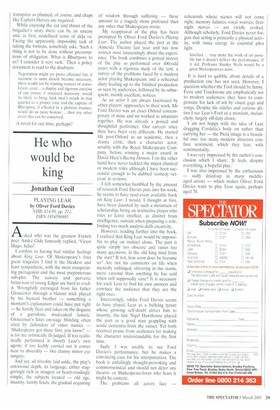He who would be king
Jonathan Cecil
PLAYING LEAR by Oliver Ford Davies NHB, £14.99, pp. 211, ISBN 1854596985 Asked who was the greatest French poet Andre Gide famously replied, 'Victor Hugo, helas!'
I confess to having had similar feelings about King Lear. Of Shakespeare's four great tragedies I find it the bleakest and least sympathetic, with the most exasperating protagonist and the most preposterous sub-plot. The naivety and perverse behaviour of young Edgar are hard to credit. Wrongfully estranged from his father Gloucester through a blatant trick played by his bastard brother — something a moment's explanation could have put right — he hastily flees and takes on the disguise of a garrulous, mud-caked lunatic. Gloucester's later on-stage blinding often cited by defenders of video nasties — 'Shakespeare got there first, you know!' — is for me artistically ill-judged. If too realistically performed it dwarfs Lear's own agony: if too feebly carried out it comes near to absurdity — like clumsy minor eye surgery.
And yet. all frivolity laid aside, the play's emotional depth, its language, either staggeringly rich in imagery or heart-rendingly simple, the subjects treated — old age, insanity, family feuds, the gradual acquiring of wisdom through suffering — these amount to a tragedy more profound than any other that Shakespeare wrote.
My reappraisal of the play has been prompted by Oliver Ford Davies's Playing Lear. The author played the part at the Almeida Theatre last year and has now written most interestingly about the experience. The book combines a potted history of the play as performed over 400-odd years with a rigorous study of the text, a survey of the problems faced by a modern actor playing Shakespeare and a rehearsal diary leading up to the finished production as seen by audiences, followed by its subsequent, mainly excellent, notices.
As an actor I am always fascinated by other players' approaches to their work. Mr Ford Davies was an exact Oxford contemporary of mine and we worked as amateurs together. He was already a poised and thoughtful performer. Our careers since then have been very different. He started life post-Oxford as an academic, then a drama critic, then a character actor, notably with the Royal Shakespeare Company, before winning a major award in David Hare's Racing Demon.I on the other hand have never tackled the major classical or modern roles although I have been successful enough to be dubbed 'comedy veteran' in reviews.
I felt somewhat humbled by the amount of research Ford Davies puts into his work; he seems to have read every available book on King Lear. I would, I thought at first, have been daunted by such a mountain of scholarship, being an instinctive player who tries to leave intellect, as distinct from intelligence, outside when preparing a role, finding too much analysis dulls creativity.
However, reading further into the book, I realised that King Lear would be impossible to play on instinct alone. The part is quite simply too obscure and raises too many questions. Is the old king mad from the start? If not, how soon does he become so? Are not his comments on life when mentally unhinged, shivering in the storm, more rational than anything he has said when still supposedly sane? It is necessary for each Lear to find his own answers and convince the audience that they are the right ones.
Interestingly, whilst Ford Davies seems to have played Lear as a bullying tyrant whose growing self-doubt drives him to insanity, the late Nigel Hawthorne played the part as a good man grappling with senile dementia from the outset. Yet both received praise from audiences for making the character understandable for the first time.
Sadly I was unable to see Ford Davies's performance, but he makes a convincing case for his interpretation. The book is unfailingly thought-provoking and commonsensical and should not deter any theatreor Shakespeare-lover who fears it might be esoteric.
The problems all actors face rehearsals where scenes will not come right, memory failures, vocal worries, firstnight nerves — are vividly evoked. Although scholarly, Ford Davies never forgets that acting is primarily a physical activity, with inner energy its essential pilot light.
Intellect ... may make the work of art possible but it doesn't deliver the performance. If it did, Professor Stanley Wells would he a great Shakespearean actor.
It is hard to quibble about details of a production one has not seen. However, I question whether the Fool should be funny. Feste and Touchstone are emphatically not to modern audiences; they have to compensate for lack of wit by visual gags and songs. Despite his riddles and curious ditties I see Lear's Fool as a mordant, melancholy, largely off-duty clown.
I am not happy with the idea of Lear dragging Cordelia's body on rather than carrying her — the Pieta image is a beautiful one: too many modern directors confuse sentiment, which they fear, with sentimentality.
I was very impressed by the author's conclusion which I share: 'It feels, despite everything, a hopeful play.'
I was also impressed by the enthusiasm — sadly dried-up in many middleaged actors — which makes Oliver Ford Davies want to play Lear again, perhaps aged 70.


































































 Previous page
Previous page